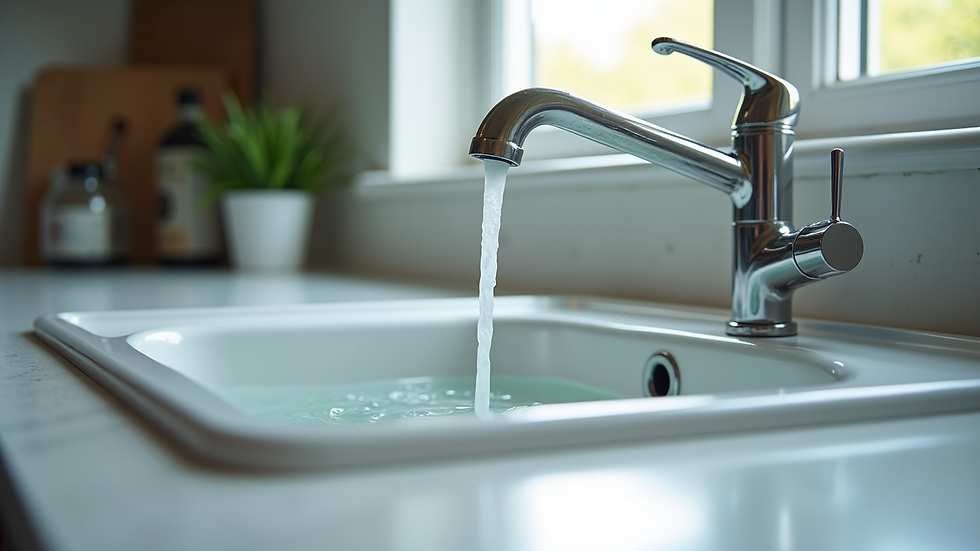Unveiling the Benefits of Water Softener Systems
- Sep 26, 2025
- 4 min read
If you’ve ever dealt with hard water, you know it can be a real headache. From stubborn soap scum to dry skin and damaged appliances, hard water causes more trouble than you might think. That’s where water softeners come in! These handy systems transform your water, making it gentler and better for your home. Today, I’m excited to share the water softener advantages and why investing in a water softener system is a smart move for any homeowner or business.
Why Water Softener Advantages Matter
Hard water contains high levels of minerals like calcium and magnesium. While these minerals aren’t harmful to your health, they can wreak havoc on your plumbing, appliances, and even your skin. Here’s why the water softener advantages are worth considering:
Protects Your Plumbing and Appliances: Hard water causes mineral buildup inside pipes and appliances. Over time, this buildup can clog pipes and reduce the efficiency of water heaters, dishwashers, and washing machines. A water softener helps prevent this by removing those minerals.
Saves Money on Repairs and Energy: When your appliances run smoothly, they use less energy and last longer. Soft water means fewer repairs and lower utility bills.
Improves Cleaning Efficiency: Soft water makes soaps and detergents work better. You’ll notice cleaner dishes, brighter clothes, and less soap scum in your sinks and tubs.
Enhances Skin and Hair Health: Hard water can dry out your skin and hair. Soft water feels gentler and leaves you feeling refreshed after every shower.

Exploring the Top Water Softener Advantages
Let’s dive deeper into some of the most exciting benefits you’ll enjoy with a water softener system:
1. Extends Appliance Lifespan
Appliances like water heaters, dishwashers, and washing machines are expensive investments. Hard water causes scale buildup inside these machines, making them work harder and wear out faster. Soft water prevents this buildup, helping your appliances last longer and perform better.
2. Reduces Soap and Detergent Usage
With hard water, you often need more soap to get things clean. Soft water lathers up quickly and rinses away easily, so you use less soap and detergent. This not only saves money but also reduces the amount of chemicals released into the environment.
3. Prevents Stains and Spots
Hard water leaves behind mineral deposits that cause spots on dishes, glassware, and fixtures. Soft water eliminates these spots, keeping your kitchen and bathroom sparkling clean.
4. Improves Water Heater Efficiency
Scale buildup inside water heaters reduces their efficiency, causing higher energy bills. Soft water keeps your water heater free of scale, helping it heat water faster and use less energy.
5. Makes Skin and Hair Feel Softer
If you’ve noticed dry skin or dull hair, hard water might be the culprit. Soft water rinses away soap more effectively, leaving your skin and hair feeling softer and smoother.

What are the disadvantages of a water softener?
While water softeners offer many benefits, it’s important to consider a few potential downsides before making a decision:
Initial Cost and Installation: Installing a water softener system requires an upfront investment. Depending on the size and type, costs can vary. However, the long-term savings often outweigh this initial expense.
Maintenance Requirements: Water softeners need regular maintenance, such as adding salt and occasional cleaning. Neglecting maintenance can reduce their effectiveness.
Environmental Concerns: Some water softeners use salt, which can impact the environment if discharged improperly. There are salt-free alternatives, but they may not be as effective in very hard water areas.
Not Suitable for Drinking Water: Softened water contains higher sodium levels, which might not be ideal for drinking or cooking. Many people use a separate filtration system for drinking water.
Despite these drawbacks, many find the benefits far outweigh the disadvantages, especially when it comes to protecting plumbing and appliances.

How to Choose the Right Water Softener System
Choosing the right water softener system can feel overwhelming, but it doesn’t have to be! Here are some tips to help you pick the best one for your needs:
Test Your Water Hardness: Knowing how hard your water is will help you select the right capacity and type of softener.
Consider Your Water Usage: Larger households or businesses with high water use need bigger systems.
Decide on Salt-Based vs. Salt-Free: Salt-based systems are very effective but require salt refills. Salt-free systems need less maintenance but may not work as well in extremely hard water.
Look for Certified Products: Choose systems certified by organizations like NSF to ensure quality and safety.
Think About Installation and Maintenance: Some systems are easier to install and maintain than others. Professional installation is often recommended.
If you want a reliable, efficient solution, check out water softener systems that fit your home or business perfectly.
Taking the Next Step Toward Softer Water
Ready to enjoy all the water softener advantages? Installing a water softener system is a smart investment that pays off in comfort, savings, and peace of mind. Whether you’re tired of dealing with hard water stains or want to protect your plumbing, a water softener can make a big difference.
If you’re in Spokane and looking for trusted plumbing and water treatment solutions, Action Drain & Plumbing is here to help. They offer expert advice, professional installation, and ongoing support to keep your water soft and your home running smoothly.
Don’t wait for hard water problems to get worse. Take action today and experience the joy of soft water!
Thanks for reading! If you have questions or want to learn more about water softener advantages, feel free to reach out. Soft water is just a call away!


Comments